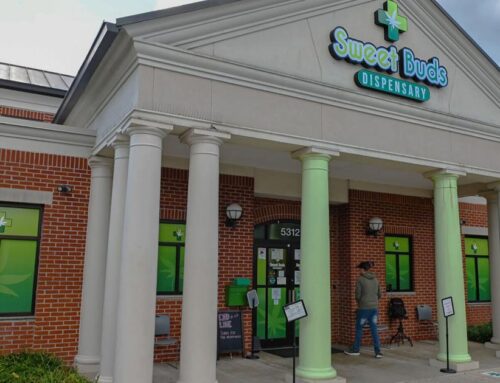Michigan’s Cannabis Industry at Risk: Why HB 4951 Must Be Rejected | stupidDOPE
September 26, 2025

Table of Contents
Show
- Understanding HB 4951 and the Proposed 24% Processor Tax
- The Cost Burden Processors Already Face
- Impact on Small Businesses and Local Operators
- How HB 4951 Could Drive Consumers Back to the Illicit Market
- Economic Consequences for Michigan
- A Threat to Innovation and Consumer Safety
- The Case for Balanced Cannabis Taxation
- What Lawmakers Should Consider Instead
- Reject HB 4951
Michigan has become one of the most dynamic and promising cannabis markets in the United States, with thriving small businesses, entrepreneurs, and community-based operators driving innovation and access. Since legalization, the state has attracted investment, created jobs, and built a regulated market that ensures safe, tested products for consumers.
But all of that progress is now in jeopardy. House Bill 4951, currently under consideration, proposes a 24% wholesale tax on cannabis processors. This legislation poses a direct threat to Michigan’s cannabis industry. If enacted, HB 4951 would significantly raise costs, eliminate already narrow profit margins, and destabilize the very businesses that have helped shape the state’s regulated market.
This article examines the far-reaching implications of HB 4951, why it risks crippling local businesses, how it could push consumers back to the illicit market, and what policymakers should consider if they want to support both sustainable tax revenue and a fair, competitive cannabis industry.
Understanding HB 4951 and the Proposed 24% Processor Tax
HB 4951 introduces a 24% wholesale tax on cannabis processors. At first glance, some lawmakers may view this as a straightforward way to increase state revenue. After all, cannabis sales have been booming, with Michigan consistently ranking among the top states in monthly cannabis sales volume.
However, the reality is far more complex. Unlike retail dispensaries, processors already operate on thin profit margins. They pay excise taxes, licensing fees, compliance costs, and contribute significantly to state and local economies. Adding a wholesale tax of this magnitude creates a lopsided system that unfairly targets one part of the supply chain.
Cannabis processors are the bridge between cultivators and retailers. They turn raw flower into concentrates, edibles, vapes, and other popular products. By singling them out for heavy taxation, HB 4951 undermines the entire industry structure.
The Cost Burden Processors Already Face
To understand why HB 4951 is so damaging, it’s important to look at the financial pressures cannabis processors already endure:
-
Excise Taxes: Michigan applies a 10% excise tax on adult-use cannabis sales, in addition to the state’s 6% sales tax. Processors already absorb indirect costs associated with this framework.
-
Licensing Fees: Processors must pay steep annual licensing fees, plus local municipal costs and renewals.
-
Compliance Costs: Testing, packaging, tracking, and reporting requirements add additional financial and labor burdens.
-
Market Pressures: Wholesale cannabis prices in Michigan have been volatile, with oversupply driving down margins for both cultivators and processors.
Layering a 24% wholesale tax on top of these costs doesn’t just trim profits — it wipes them out. For many small and mid-sized operators, survival would be impossible.
Impact on Small Businesses and Local Operators
One of the greatest successes of Michigan’s cannabis industry has been the growth of local, independently owned businesses. Unlike other states where large corporations dominate, Michigan’s market has fostered opportunities for entrepreneurs, family-run companies, and minority-owned businesses.
HB 4951 would reverse this progress. Large multistate corporations may be able to absorb higher taxes by leveraging economies of scale or cutting costs elsewhere. Small businesses, however, would have no cushion. Many would close, leading to:
-
Job Losses: Every processing facility supports dozens of employees, from lab technicians to delivery drivers. Closures would mean layoffs and higher unemployment.
-
Community Impact: Many cannabis businesses are deeply rooted in local communities, contributing to neighborhood revitalization and tax bases. Losing them would hurt both consumers and municipalities.
-
Market Consolidation: With fewer small players, corporate consolidation would accelerate, reducing diversity, competition, and consumer choice.
How HB 4951 Could Drive Consumers Back to the Illicit Market
When taxes on cannabis become excessive, consumers often turn to unregulated sources where products are cheaper. Michigan has already made significant strides in moving consumers away from illicit channels by offering safe, regulated alternatives. HB 4951 threatens to undo that progress.
Higher taxes at the processing level would translate into higher retail prices. Dispensaries would be forced to raise costs on edibles, concentrates, and vape products, making them less affordable. Consumers — particularly those already price-sensitive — could return to the unregulated market where products are untested and potentially unsafe.
This shift would not only harm licensed businesses but also reduce tax revenue for the state, undermining the very goal HB 4951 aims to achieve.
Economic Consequences for Michigan
Michigan’s cannabis industry is a significant economic engine. According to recent data, cannabis sales generate billions annually, with millions flowing into state and local government programs. This revenue supports schools, infrastructure, and public health initiatives.
By introducing HB 4951, lawmakers risk shrinking the legal market rather than expanding it. The consequences include:
-
Reduced State Revenue: With fewer operating businesses and lower legal sales, overall tax intake will decline.
-
Lost Investment: Investors may pull back from Michigan, redirecting capital to states with friendlier policies.
-
Weakened Supply Chain: Cultivators, retailers, and ancillary businesses depend on processors. If processors fail, the ripple effect will impact the entire ecosystem.
In short, the economic promise of cannabis in Michigan could be compromised by shortsighted tax policy.
A Threat to Innovation and Consumer Safety
Processors play a vital role in innovation within cannabis. They develop new product formats, improve extraction techniques, and create consumer experiences that fuel demand. By stifling processors with excessive taxes, HB 4951 threatens to slow innovation and limit consumer access to cutting-edge products.
Equally important, processors ensure product safety and compliance. Licensed processors test for contaminants, ensure proper labeling, and maintain strict quality control. If consumers return to the illicit market because of higher costs, they risk exposure to unsafe, untested products.
The Case for Balanced Cannabis Taxation
Taxation is a legitimate tool for raising revenue, but it must be applied fairly and sustainably. Michigan has an opportunity to learn from other states:
-
Oregon and Colorado have kept cannabis taxes at moderate levels, helping their industries remain competitive and compliant.
-
California, by contrast, imposed high taxes early on, which fueled a thriving illicit market and forced lawmakers to later scale back.
A balanced approach recognizes that excessive taxes don’t generate sustainable revenue — they drive consumers and businesses away from the legal system.
What Lawmakers Should Consider Instead
Rather than pushing forward with HB 4951, lawmakers should consider policies that strengthen Michigan’s cannabis market while ensuring steady revenue growth:
-
Support Small Businesses: Create tax credits, grants, or reduced fees for local and minority-owned operators.
-
Encourage Compliance: Keep taxes at levels that make it more attractive to operate legally than to risk the illicit market.
-
Diversify Revenue Streams: Explore broader industry partnerships, licensing, and reinvestment rather than punitive taxation.
-
Foster Job Growth: Policies that help businesses thrive ultimately expand employment and increase taxable income.
Michigan doesn’t need HB 4951 to grow its cannabis economy. It needs smart, fair, and balanced policies that sustain it.
Reject HB 4951
HB 4951’s 24% wholesale tax on processors would destabilize Michigan’s cannabis industry, hurt small businesses, reduce state revenue, and endanger consumer safety. Lawmakers must reject this bill and work toward policies that protect jobs, investment, and the regulated market.
Michigan has built a thriving cannabis industry that benefits entrepreneurs, consumers, and communities alike. Now is the time to safeguard that progress, not undermine it. Michigan’s cannabis industry is at a turning point, and every voice matters. Lawmakers need to hear directly from the people whose businesses, jobs, and communities are on the line.
Take Action Today
Phone Numbers and Further Contact Information
Michigan House – Michigan Representatives
https://share.google/rZnKNliExWZ2Lpm8J
Contact your representative today and urge them to vote NO on HB 4951 to protect Michigan’s cannabis future.
Search
RECENT PRESS RELEASES
Related Post









